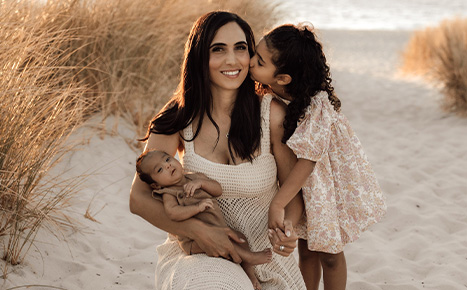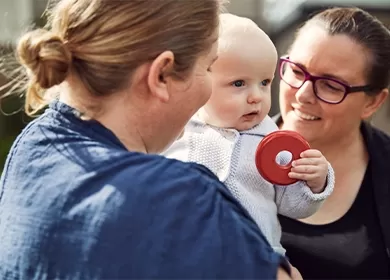The newborn bubble
We all know that donated blood saves lives when people are ill or injured. But you might not know how important donated blood is for pregnant women.
In December last year, Zeina gave birth to her second child.
But Jake was six and a half weeks early. That means time in the neonatal intensive care unit.
Meanwhile, Zeina’s C-section wound got infected. Seriously. That means time in the intensive care unit.
“Not only was I separated from my daughter and husband at home, but I couldn’t get to enjoy that newborn bubble with my son.”

Now, Zeina and her family are inseparable. Thanks to the blood transfusion she received.
Zeina isn’t alone.
We all know that donated blood saves lives when people are ill or injured. But you might not know how important donated blood is for pregnant women.
In fact, one in six Aussie mums need blood during pregnancy or birth. It can be extremely stressful and put a real dint in the newborn bubble. There are a number of reasons a new mum might need donated blood.
- Anaemia: More blood means pregnant women need more iron. Sometimes, iron deficiency can’t be manage and a mother needs a red cell transfusion to protect her and her baby.
- Bleeding: Usually bleeding during pregnancy doesn’t call for blood products or major worry. But in some cases, women need a transfusion of red cells, platelets and plasma products (learn more about the parts of your blood).
- Haemolytic disease of the fetus and newborn (HDFN): This is when a mother’s body develops antibodies that can attack the baby’s red blood cells, leading to anaemia. When it’s severe, the baby will need a transfusion of red cells. But most of the time it can be avoided with anti-D.
- Immune platelet disorders: These happen when a mother’s platelet antibodies cross the placenta and harm the baby’s platelets. Immunoglobulin for the mother, and special platelet transfusions until delivery and in the first few days of life for the baby usually keep it under control.
How can you help?
While it can be the happiest time of your life, seeing a partner struggle through pregnancy can leave you feeling…well, a bit useless. Maybe your foot massage technique isn’t quite enough. Maybe the late-night trips for a food craving aren’t cutting the mustard.
There’s a big gap between the desire to help and the ability to do so.
So, as you prepare for your baby to enter the world, imagine the satisfaction of knowing you’ve given the gift of blood to new mothers and their babies at their most vulnerable time.
The best part is that you can donate whole blood every three months, or every trimester, and plasma every two weeks. It’s a small act of kindness that can make a world of difference to someone’s life. And maybe even give them their newborn bubble back.


